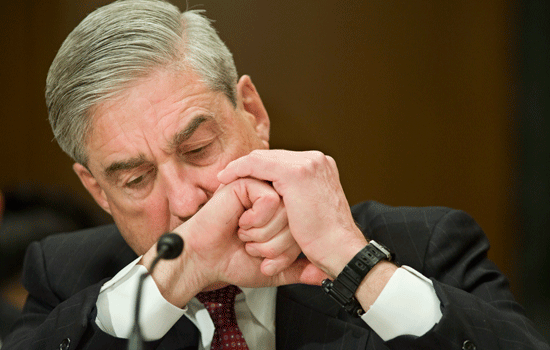
FBI Director Robert Mueller testifies on Capitol Hill in Washington, Thursday, April 15, 2010, before the Senate Commerce, Justice and Science subcommittee hearing on the FBI's fiscal 2011 budget. (AP)
Fifteen years after the Oklahoma City bombing, the specter of domestic terrorism has returned to haunt the Obama administration, with a warning from the FBI that “home-grown and lone-wolf extremists” now represent as serious a threat as Al Qaeda and its affiliates, The Times reported on Saturday.
The warning, from the FBI Director, Robert Mueller, came as the former President Clinton drew parallels between the Oklahoma City tragedy and a recent upsurge in anti-government rhetoric, while American television audiences heard Timothy McVeigh, the Oklahoma City bomber, describe the “absolute rage” that drove him to plan an attack that killed 168 men, women and children.
An FBI spokesman said Friday that Mueller was referring to right-wing extremist groups and anti-government militias, as well as American Islamists, in his testimony to the Senate committee that must approve the FBI’s $8.3 billion budget.
Last month federal agents arrested nine members of a Christian militia based in Michigan, calling itself the Hutaree. They have been charged with plotting to murder local police with a stash of guns, knives and grenades.
Since the passage of President Obama’s health reforms, the FBI has also made arrests in Seattle and San Francisco after death threats were sent to Democratic senators.
“It’s one thing to express dissatisfaction with the Government but once you cross the line with a violent threat, that’s a violation that we take extremely seriously,” Bill Carter, the bureau’s spokesman, said.
The Oklahoma bombing was followed by an exhaustive civilian trial in which McVeigh became a hate figure to most but a hero to some members of the survivalist fringe on which he was radicalized.
He was executed in 2001, but not before granting 45 hours of death-row interviews to the authors of a book, American Terrorist, whose tapes will be broadcast for the first time on Monday.
McVeigh never confessed to the bombing in court but he appears to do so on the tapes.
“I feel no shame for it,” he says. “This was something that I saw as a larger good, and I know that, as I analyzed the history of not just the U.S., but all nations throughout the history of mankind. People have killed for what they believed was the greater good, and it’s accepted. Sometimes killing is accepted.”
The White House was careful to emphasize that the threat of external terrorism remained acute but senior officials are privately confident that military operations in Afghanistan are going well and putting Al Qaeda on the back foot.
Few people in Washington are as confident about the domestic threat.





















